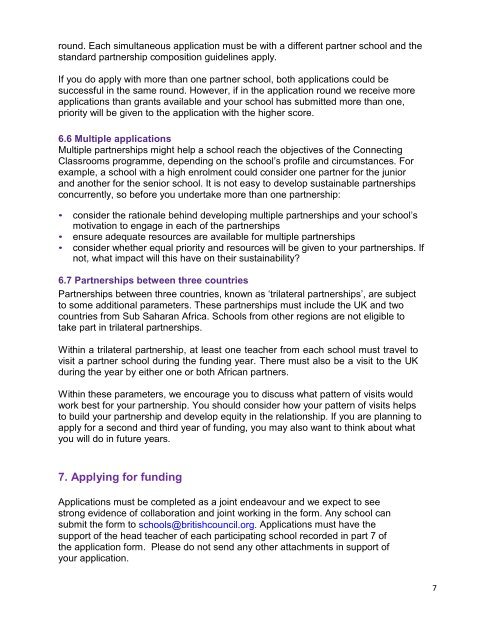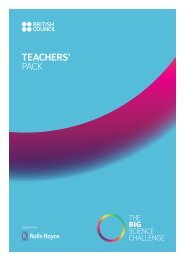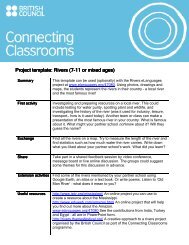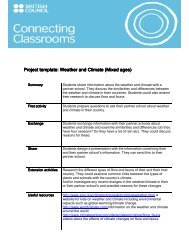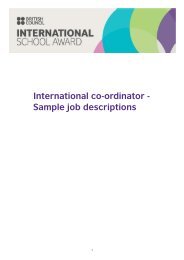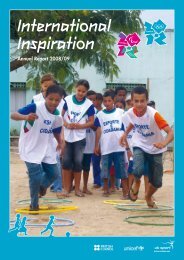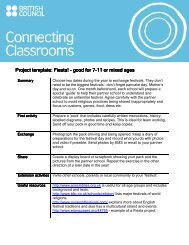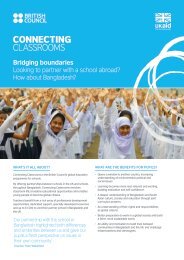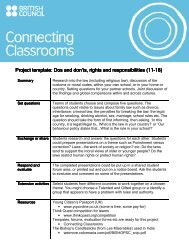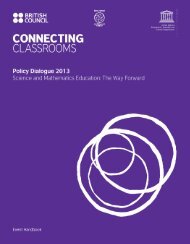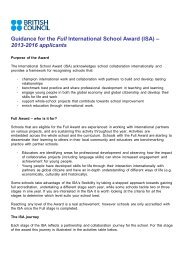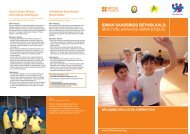A guide to school partnerships - British Council Schools Online
A guide to school partnerships - British Council Schools Online
A guide to school partnerships - British Council Schools Online
Create successful ePaper yourself
Turn your PDF publications into a flip-book with our unique Google optimized e-Paper software.
ound. Each simultaneous application must be with a different partner <strong>school</strong> and thestandard partnership composition <strong>guide</strong>lines apply.If you do apply with more than one partner <strong>school</strong>, both applications could besuccessful in the same round. However, if in the application round we receive moreapplications than grants available and your <strong>school</strong> has submitted more than one,priority will be given <strong>to</strong> the application with the higher score.6.6 Multiple applicationsMultiple <strong>partnerships</strong> might help a <strong>school</strong> reach the objectives of the ConnectingClassrooms programme, depending on the <strong>school</strong>’s profile and circumstances. Forexample, a <strong>school</strong> with a high enrolment could consider one partner for the juniorand another for the senior <strong>school</strong>. It is not easy <strong>to</strong> develop sustainable <strong>partnerships</strong>concurrently, so before you undertake more than one partnership:• consider the rationale behind developing multiple <strong>partnerships</strong> and your <strong>school</strong>’smotivation <strong>to</strong> engage in each of the <strong>partnerships</strong>• ensure adequate resources are available for multiple <strong>partnerships</strong>• consider whether equal priority and resources will be given <strong>to</strong> your <strong>partnerships</strong>. Ifnot, what impact will this have on their sustainability?6.7 Partnerships between three countriesPartnerships between three countries, known as ‘trilateral <strong>partnerships</strong>’, are subject<strong>to</strong> some additional parameters. These <strong>partnerships</strong> must include the UK and twocountries from Sub Saharan Africa. <strong>Schools</strong> from other regions are not eligible <strong>to</strong>take part in trilateral <strong>partnerships</strong>.Within a trilateral partnership, at least one teacher from each <strong>school</strong> must travel <strong>to</strong>visit a partner <strong>school</strong> during the funding year. There must also be a visit <strong>to</strong> the UKduring the year by either one or both African partners.Within these parameters, we encourage you <strong>to</strong> discuss what pattern of visits wouldwork best for your partnership. You should consider how your pattern of visits helps<strong>to</strong> build your partnership and develop equity in the relationship. If you are planning <strong>to</strong>apply for a second and third year of funding, you may also want <strong>to</strong> think about whatyou will do in future years.7. Applying for fundingApplications must be completed as a joint endeavour and we expect <strong>to</strong> seestrong evidence of collaboration and joint working in the form. Any <strong>school</strong> cansubmit the form <strong>to</strong> <strong>school</strong>s@britishcouncil.org. Applications must have thesupport of the head teacher of each participating <strong>school</strong> recorded in part 7 ofthe application form. Please do not send any other attachments in support ofyour application.7


